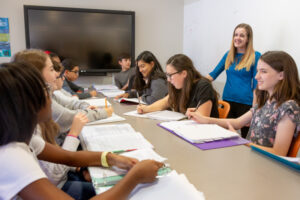Personalized Professional Learning
![]()
Research-based learning is neither a replacement nor a substitute for authenticity of practice. Future ready educators experience, prepare, and model forward-thinking personalized professional learning that is thoughtfully and intentionally designed to inspire leadership competencies, encourage effective instructional practices, and support learner and educator well-being and success.

Effective and intentionally designed professional learning also must align with the policies and practices that schools embrace. It is critical to prioritize professional learning to explicitly address the seamless integration of cognitive, social-emotional, and academic skills.
Future ready leaders establish and sustain this kind of collaboratively innovative culture by highlighting the need for iteration and personalized support to meet the needs of all educators and learners. With a systemic focus, all professional learning instances should exemplify instruction that is learner centered, engaging, empathetic, and inclusive, with a modeled and paralleled emphasis of social-emotional skills intricately embedded within academic content.
Educators who receive and actively engage in social-emotional-informed teaching practices recognize all students for who they are and for the stories they bring. They see their strengths, assets, and contributions. They readily identify opportunities and create experiences that reinforce their classrooms as safe, nurturing, positive, and supportive environments in which each and every student feels seen, welcome, encouraged, and valued. Future Ready Districts recognize and prioritize the health and well-being of both students and staff as part of their comprehensive professional learning plan.
- How can professional learning be designed to increase interactivity and application?
- Is there modeling of the intentional use of language (oral and body) to display behaviors that show
- respect for diverse cultures, backgrounds, languages, and experiences;
- appreciation for diverse cultures, backgrounds, languages, and experiences; and
- inclusivity of diverse cultures, backgrounds, languages, and experiences?
- Is there role playing to allow for diversity in language (oral and body) and responses?
- What professional learning opportunities are available that
- explicitly focus on cultivating trust and inclusive relationships in the classroom;
- explicitly support social-emotional learning in the classroom;
- focus on trauma-informed care;
- focus on cultural responsiveness; and
- focus on unconscious bias and antiracist teaching?
- What professional learning opportunities broaden teacher awareness of and support for homeless, transient, and impoverished students?
- How can educators better identify and make available resources to help those students most in need?
- What professional learning opportunities empower strategies for staff self-care?
Highlighted Resource
Refining Our Campus Culture: SEL Is Not Extra, It's Essential
There is no denying that social emotional learning (SEL) has been the central focus in the education world over the last year. Now, a year into this pandemic, people are learning more about the actual experiences of their students, families, teachers, and educational leaders.
Implementation Guide
Relevant, Job-Embedded Professional Learning
Effective school leaders embed professional learning needs into the school schedule and each teacher’s day so that learning is part of day-to-day practice, also known as “job-embedded learning.” When school leaders place a priority on job-embedded learning, they foster conditions necessary for teachers to transfer new skills into practice within a strong system of support.

This guide is generously supported by GoGuardian, Pear Deck, and Edulastic.